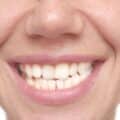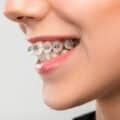Crooked teeth are not merely an aesthetic concern; they can have significant implications for oral health. Misalignment may lead to difficulties in chewing, increased wear on tooth enamel, and even jaw pain. Understanding these health risks is vital for individuals, as untreated orthodontic issues can escalate into more serious problems, including gum disease and tooth loss. By addressing crooked teeth early, one can improve both their smile and overall dental health, paving the way for a healthier future.
Understanding Crooked Teeth
Crooked teeth refer to various types of dental misalignments, including crowding, gaps, and irregular positioning. Crowding occurs when there is insufficient space for teeth to align properly, often leading to overlapping. Gaps, on the other hand, result from missing teeth or jaw discrepancies, while misalignments involve improper positioning of the teeth.
Several factors contribute to these conditions. Genetics play a significant role, as inherited traits can influence jaw size and tooth alignment. Other common causes include the early loss of baby teeth, which can disrupt the natural eruption of permanent teeth, and habits such as thumb sucking, which can affect jaw development and tooth position over time. Understanding these causes is vital for both prevention and effective treatment.
Oral Health Implications
Impact on Oral Hygiene and Plaque Accumulation
- Crooked teeth can create hard-to-reach areas that make brushing and flossing more difficult.
- Increased plaque accumulation in these areas can lead to bad breath and higher rates of cavities.
Increased Risk of Gum Disease and Tooth Decay
- The buildup of plaque can cause gingivitis, which, if untreated, may progress to more severe gum disease.
- Crowded or misaligned teeth are more susceptible to decay due to uneven wear and tear.
Effects on Bite and Jaw Alignment Leading to TMJ Disorders
- Misalignment can result in an improper bite, causing uneven pressure on the teeth and jaw.
- This uneven distribution can lead to temporomandibular joint (TMJ) disorders, causing pain, headaches, and difficulty in chewing.
Psychosocial Effects
The Psychological Impact of Crooked Teeth
- Crooked teeth can negatively influence self-esteem, leading to feelings of embarrassment and self-consciousness.
- Individuals may avoid social interactions or feel less confident in professional settings due to concerns about their smile.
The Connection Between Oral Health and Overall Well-Being
- Oral health is closely tied to general health; poor dental hygiene can contribute to systemic issues, such as heart disease and diabetes.
- A healthy smile promotes confidence, enhancing social interactions and overall quality of life, leading to improved mental and emotional well-being.
Preventative Measures
Importance of Early Dental Assessments for Children
- Early dental assessments are crucial for identifying potential orthodontic issues before they become more complex.
- The American Association of Orthodontists recommends a first visit by age seven, allowing for timely intervention if necessary.
Tips for Maintaining Proper Oral Hygiene
- Encourage children to brush twice daily with fluoride toothpaste and floss regularly to prevent plaque buildup.
- Regular dental check-ups should be scheduled at least twice a year to monitor dental health and hygiene practices.
Treatment Options
Overview of Orthodontic Treatments
- Various orthodontic treatments are available to correct crooked teeth, including traditional braces, which use brackets and wires, and clear aligners, which offer a more discreet option.
- Both methods are effective in addressing alignment issues, with treatment duration varying based on the severity of the case.
Importance of Consulting with an Orthodontist for Personalised Plans
- Each patient’s dental situation is unique; consulting with an orthodontist ensures the development of a customised treatment plan that considers individual needs and goals.
- Orthodontists conduct thorough evaluations and use advanced imaging technology to create a comprehensive strategy for achieving optimal results.
Real-Life Success Stories
Amelia’s Transformation
After struggling with severe teeth crowding for years, Amelia sought orthodontic treatment at 28. Through clear aligners, her journey lasted 18 months. She now boasts a confident smile and reports significant improvements in oral hygiene.
Micah’s Journey
At 15, Micah faced bullying due to his misaligned teeth. After starting treatment with traditional braces, he regained his self-esteem and completed his orthodontic journey in just two years. Today, he encourages peers to embrace their smiles.
Sophie’s Experience
As a busy professional, Sophie opted for lingual braces to straighten her teeth discreetly. Despite initial discomfort, the results were worth it. After 12 months, she enjoys a straight smile without compromising her professional image.
FAQs
What are the common causes of crooked teeth?
Crooked teeth can result from various factors, including genetics, early loss of baby teeth, thumb sucking, and prolonged use of pacifiers.
How can I tell if my child needs orthodontic treatment?
Signs may include overcrowded teeth, difficulty chewing, or noticeable misalignment. A dental assessment by age seven is advisable for early detection.
What orthodontic treatment options are available?
Common treatments include traditional braces and clear aligners, both designed to correct misalignment and improve dental aesthetics.
How long does orthodontic treatment usually take?
Treatment duration varies based on individual needs but typically lasts between 12 to 36 months.
Are there financing options available for orthodontic treatment?
Many orthodontists offer payment plans, insurance options, and flexible financing to make treatment more accessible.
Will orthodontic treatment hurt?
While some discomfort is common during the adjustment phases, it usually subsides within a few days. Over-the-counter pain relief can help manage any pain.
How much does orthodontic treatment cost?
Costs can vary widely depending on the complexity of the case and treatment method. It is best to consult an orthodontist for a detailed estimate based on individual needs.
Empowering Your Smile Journey
Crooked teeth can lead to significant oral health issues, including difficulties with hygiene, increased risk of gum disease, and potential jaw alignment problems. These implications underscore the importance of seeking professional advice to explore suitable treatment options. Addressing misalignment not only enhances oral health but also boosts self-esteem and overall well-being.
Consulting with an orthodontist ensures a customised approach to achieving a healthier, more confident smile. Don’t hesitate to take that crucial step towards better oral health.
Also Read: Spotlight on Orthodontic Care: Aligning Jaws and Boosting Health in Kerikeri
Have you read these articles?
 Affordable Options For Straightening Crooked Teeth In Auckland
Affordable Options For Straightening Crooked Teeth In Auckland
 Spotlight on Orthodontic Care: Aligning Jaws and Boosting Health in Kerikeri
Spotlight on Orthodontic Care: Aligning Jaws and Boosting Health in Kerikeri
 Helpful Guide to How Christchurch Orthodontists Fix Teeth Crowding
Helpful Guide to How Christchurch Orthodontists Fix Teeth Crowding
 Understanding and Correcting Overbites: A Useful Patient Guide
Understanding and Correcting Overbites: A Useful Patient Guide
 Clear Aligner Technology Explained: What Auckland Patients Need to Know
Clear Aligner Technology Explained: What Auckland Patients Need to Know






